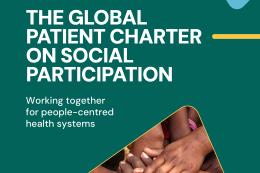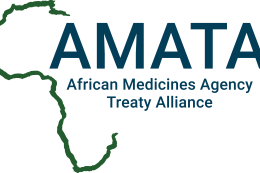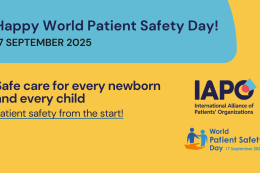IAPO Policy Report Launch to improve Breast Cancer Care in the Middle East and Africa

Scheduled for Tuesday, 7 May 2024, from 12:00 to 13:15 GMT+1, the event will convene patients, patient organizations, policymakers, and other key stakeholders in the global health arena working with cancer care and women´s health in a virtual 75-minute session.
This virtual launch will also offer a platform to discuss how the policy report can be used as an advocacy tool by patients, caregivers and patient advocates committed to improving breast cancer care at regional and national levels.
Panellists include:
-
Thomas Hofmarcher, IHE – The Swedish Institute of Health Economics
-
Dr Sawsan AlMadhi, Advocacy Advisor, AlignnEficient Health Consultancies CO LLC
-
Dr Reem Al-Ajlouni, Director of the Jordan Breast Cancer Program/King Hussein Cancer Foundation
-
Dr Giuseppe Troisi, Technical Officer, Noncommunicable Diseases Prevention (NCP), UHC/Noncommunicable Diseases and Mental Health (NMH), World Health Organization – EM Regional Office
-
Ikram Eseghir, Founder and president of NABD-BC2, Best Care for Breast Cancer Association (Morocco)
Background and relevance of the report
Breast cancer poses a significant public health challenge in the Middle East and Africa, constituting 34% of new cancer cases and 22% of cancer-related deaths among women in 2020. Over the past two decades, the region has witnessed nearly a doubling of new breast cancer cases annually. While healthcare systems struggle with the increasing patient load, there's unprecedented potential to enhance patient care, facilitating not only extended survival but also the potential for recovery. However, the unfortunate reality is that a majority of patients in the Middle East and Africa lack access to quality care, which compromises their chances of survival compared to patients in Europe or North America.To address this mounting burden, the World Health Organization (WHO) launched the Global Breast Cancer Initiative (GBCI) in 2021, aiming to offer strategic direction and coordination to enhance breast cancer care, particularly in low- and middle-income countries. The GBCI endeavours to annually decrease the breast cancer mortality rate by 2.5%, potentially saving 2.5 million lives by 2040.
The report being launched in this event mirrors the WHO GBCI, offering insights into the current state of breast cancer care across nine Middle Eastern and African countries (MEA-9): Algeria, Egypt, Israel, Jordan, Morocco, Saudi Arabia, South Africa, Türkiye, and the United Arab Emirates. It addresses the GBCI's three pillars – detection, diagnosis, and treatment – supplementing these with an outline of care organization and an overview of healthcare systems and breast cancer care governance. The study also aims to aid local policymakers in decision-making and prioritizing breast cancer care initiatives and to facilitate the exchange of best practices in breast cancer care throughout the MEA region.
IAPO commissioned IHE (The Swedish Institute for Health Economics) to conduct this research analysis and would like to thank the grants received from AstraZeneca, Eli Lilly, MSD, Novartis Middle East FZE (“Novartis”), and Pfizer, which have come together to support the development of this policy report.



